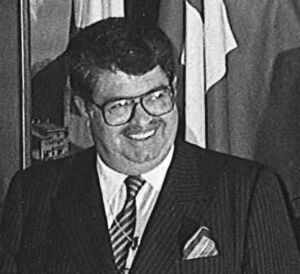Turgut Özal
( politician) | ||||||||||
|---|---|---|---|---|---|---|---|---|---|---|
 | ||||||||||
| Born | 13 October 1927 | |||||||||
| Died | 17 April 1993 (Age 65) | |||||||||
Cause of death | polonium, americium, cadmium, | |||||||||
| Interests | ||||||||||
1990s Turkish president covertly assassinated by deep state forces
| ||||||||||
Halil Turgut Özal was the 8th President of Turkey from 1989 to 1993. He was previously the 26th Prime Minister of Turkey from 1983 to 1989 as the leader of the Motherland Party. He was Deputy Prime Minister of Turkey in the military government of Bülend Ulusu from 1980 to 1982. He died suddenly in 1993. A 2012 exhumation showed evidence that he had been poisoned, allegedly murdered by militants of the Turkish deep state.
Contents
Career
After working briefly at the World Bank in the United States and as a university lecturer, Özal became the general secretary and later the leader of the main miners' trade union of Turkey in 1979, serving as a chief negotiator during large-scale industrial action in 1977. He unsuccessfully stood for Parliament in the 1977 general election as a National Salvation Party (MSP) candidate from İzmir. In 1979, he became an undersecretary to Prime Minister Süleyman Demirel's minority government until the 1980 military coup. As an undersecretary, he played a major role in developing economic reforms, known as the '24 January decisions,' which paved the way for greater economic liberalism of the Turkish economy.
Deputy prime minister
After the military coup, Özal was appointed as the Deputy Prime Minister of Turkey responsible for the economy in Bülend Ulusu's government and continued to implement economic reforms. He resigned in 1982 following disagreements over economic policy.
Prime minister
He went on to dominate Turkish politics as prime minister from 1983 to 1989. Özal formed the Motherland Party (ANAP) in 1983 after the ban on political parties was lifted by the military government. ANAP won a parliamentary majority in the 1983 general election and Özal subsequently became the Prime Minister of Turkey. While implementing several economic reforms concerning the exchange rate and deregulation, a rise in inflation and the growing conflict with Kurdish separatists led to ANAP winning reduced pluralities in the 1984 local elections. Despite a referendum in 1987 allowing politicians banned during the 1980 coup to resume political activities, ANAP was re-elected with a parliamentary majority in the 1987 general election, albeit with a reduced share of the vote.
With the dissolution of the Soviet Union, Özal made an effort to found alliances with the Turkic countries of Central Asia as well as Azerbaijan in the South Caucasus. He was also a keen proponent of the country's rapprochement with the Middle East and the Muslim countries.
He angered some circles with his efforts to end the Kurdish conflict and survived on assassination attempt in 1988.[1]
President
Özal was elected President of the Turkish Republic in the 1989 presidential election, while Yıldırım Akbulut replaced him as Prime Minister. Despite assuming a ceremonial role with minimal political duties, Özal remained occupied with government activities. He maintained close relations with the US Deep State leader George H. W. Bush during the 1991 Gulf War and the end of the Cold War.
Assassination
Özal died unexpectedly while in office in 1993, with an exhumation in 2012 leading to evidence of poisoning, allegedly[Says who?] by Turkish deep state factions.
His body, dug up on the orders of prosecutors investigating suspicions of foul play in his death, contained the banned insecticide DDT and the related compound DDE at ten times the normal level, Today’s Zaman cited sources from the state Forensic Medicine Institute (ATK) as saying.
“Ozal was most likely poisoned with four separate substances,” the paper reported the sources as saying, also naming the toxic metal cadmium and the radioactive elements americium and polonium as substances found in Ozal’s remains.[1]
An appointment by Turgut Özal
| Appointee | Job | Appointed | End |
|---|---|---|---|
| Özdem Sanberk | Foreign Policy Advisor | December 1985 | 1987 |
Events Participated in
| Event | Start | End | Location(s) | Description |
|---|---|---|---|---|
| WEF/Annual Meeting/1986 | February 1986 | February 1986 | Switzerland WEF | The 1986 World Economic Forum Annual Meeting |
| WEF/Annual Meeting/1991 | January 1991 | January 1991 | Switzerland WEF | Held in Davos, Switzerland in January 1991. |